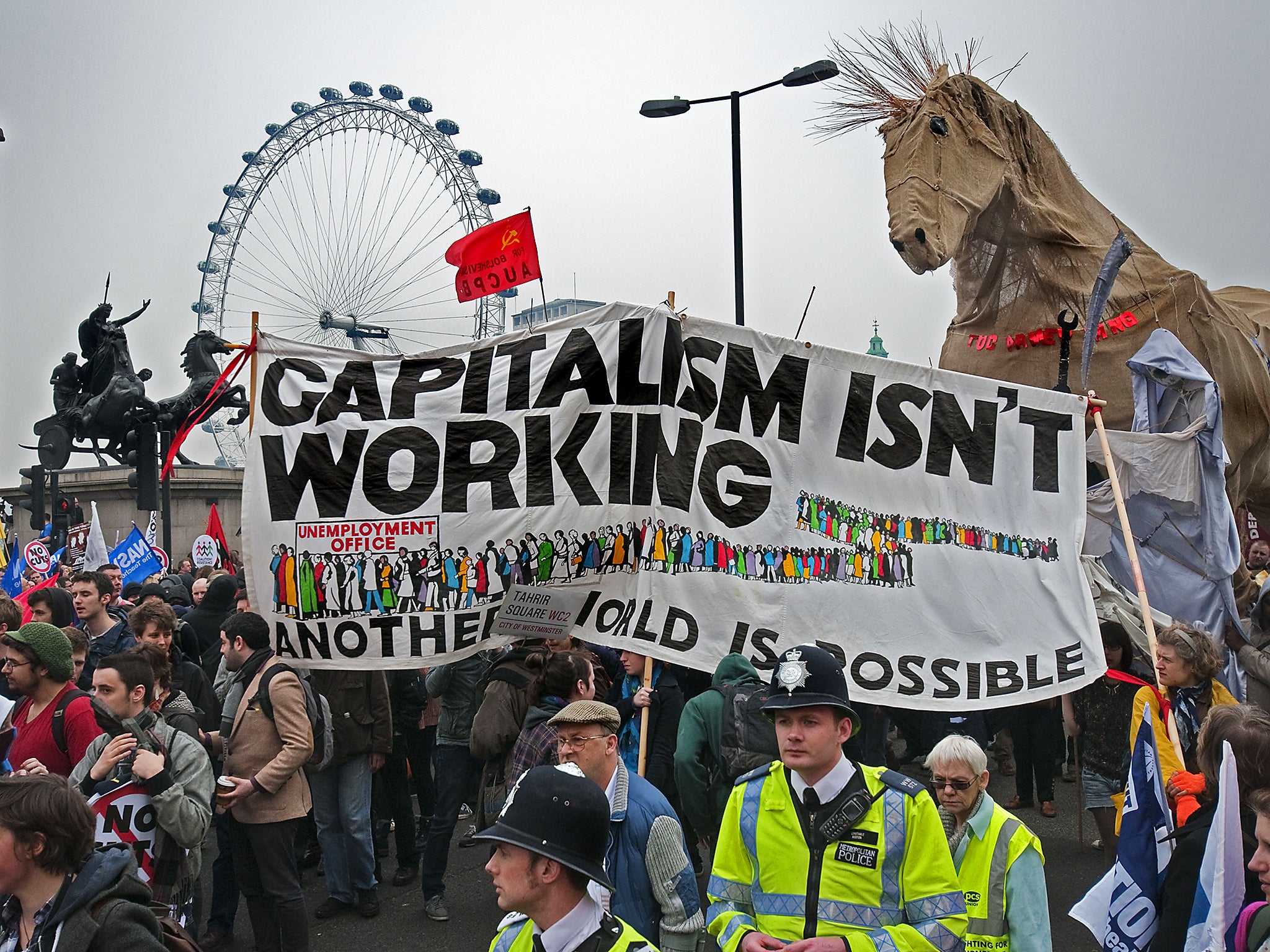The rise and fall of big business
Big firms like stability, and 2017 offers little of that, says Hamish McRae. Add in a darkening public mood and the double-edged sword of tech innovation, and the year will be a challenge for some, but could see some surprising winners

Your support helps us to tell the story
From reproductive rights to climate change to Big Tech, The Independent is on the ground when the story is developing. Whether it's investigating the financials of Elon Musk's pro-Trump PAC or producing our latest documentary, 'The A Word', which shines a light on the American women fighting for reproductive rights, we know how important it is to parse out the facts from the messaging.
At such a critical moment in US history, we need reporters on the ground. Your donation allows us to keep sending journalists to speak to both sides of the story.
The Independent is trusted by Americans across the entire political spectrum. And unlike many other quality news outlets, we choose not to lock Americans out of our reporting and analysis with paywalls. We believe quality journalism should be available to everyone, paid for by those who can afford it.
Your support makes all the difference.Big business likes stability, and it does not expect that in 2017. Politics is, of course, unusually unstable, but so too is the impact of technology and the cost of energy and basic raw materials – the start of the production chain. So it is set to be a difficult year. But hanging over everything is the deeper challenge, that the public mood in the developed world is tilting against the business community rather in the same way as it did towards finance after the 2008 crash.
You can see this in a number of ways. In the US, Donald Trump, supposedly a supporter of business, attacked companies for shifting jobs abroad. The motor industry in Europe is under attack for its performance on pollution. Though the VW scandal emerged in the US, it is the diesel engines of European-built cars where the challenge is greatest. Within the UK, big business was ignored when it came to the Brexit vote. Globally, energy companies are under attack more generally. Pharmaceuticals ditto. Even the high-tech giants are not immune, with Facebook under attack for “fake news” and Amazon and Uber for their work practices.
All this can be seen in the general anti-globalisation mood. Most large companies are indeed global operators, in the sense that they have businesses in many countries. Even those whose business is primarily national rely on a global supply-chain. Any attack on globalistion is an attack on them, for they have the most to lose.

For the moment, these forces seem containable. There is certainly an ambiguity in the public’s response: demonstrations against globalisation are co-ordinated by iPhone. The tax practices of the Googles of this world have been under attack in Europe, but every country wants them to come and set up offices and employ more people. But finance has become less international over the past few years, with banks withdrawing from many foreign markets or scaling down their operations there. The same trend may start to develop in other areas of commerce and industry.
There is one specific aspect of globalisation that will be tested in the year ahead. Will foreign investment still be given a tailwind by governments around the world? Inevitably, countries vary. The US was already concerned about inward Chinese investment and will surely become more so under the new administration. In Europe, and particularly the UK, by contrast, Chinese investment is seen as a vote of confidence. But this could change. If this were to happen, then another plank of global economic integration would be pulled away. We will know more by the end of 2017.
The second great issue facing the business community will be the impact of technology. Is it creating jobs or destroying them? Will the communications revolution disrupt yet more sectors of activity, as it has the taxi business, newspapers, the hospitality industry, high-street retailing and so on?

It is perhaps easiest to see the impact under three broad heads: industries where technology speeds up incremental change, those that are being transformed by technology, and those industries that are brand new and still to be created.
As far as the first group is concerned, it is fairly easy to see the direction of change in 2017. It will be more of the same. So the costs of air travel will continue to be squeezed down, and the greater efficiency of new aircraft will enable new routes to be opened. The Qantas non-stop Perth-London route is a good example of that. Over time this could have a significant impact on present airline hubs. Will planes need to use them to refuel so often, or is the very long-distance flight a niche market? At any rate, costs will continue to be squeezed down by clever application of existing technologies.
There are many other examples of technology gradually improving the service or product, or at least enabling the same product to be delivered at lower cost. But this coming year there is one sector that will be wondering whether it is being catapulted from incremental change to transformative change, and that is the motor industry. The reason? The shift to pure electric cars. So far the move has been slow, with hybrid technology gradually increasing market share, but also with pure electric (i.e. no auxiliary petrol back-up) very much a niche pioneered by Tesla.

The age of the internal combustion engine is clearly drawing to a close, but what is changing is the pace at which this happens. By the end of 2017 the industry will have a much clearer idea of the timescale. In 10 years’ time, will more than half the cars in the West be pure electric? If so, established manufacturers have to move now. This is a much bigger issue than that of self-driving cars. That technology can be added on to an existing product quite simply. Changing your entire manufacturing process is a challenge of an utterly different order of magnitude.
The third aspect of the interface between technology and business that will develop rapidly in 2017 will be the transformation by artificial intelligence. The trouble is that AI is moving so fast that it is impossible to predict which applications will burst out and which will remain dormant. The business community is rightly frightened, for though AI creates many opportunities it is also a threat to established competences. Some professional services, including legal work, seem particularly threatened.
And entirely new industries to be created by technological breakthroughs? Well, we may see some in 2017, but by their very nature these are impossible to predict.
I can see at least two other big issues overhanging 2017. One will be what happens to the oil price, and other energy and raw material prices. Energy and raw materials are the start of the global production chain. They affect everything that happens afterwards. We go into the year with a rising oil price, thanks to production curbs in OPEC. That will pull up all energy costs, which in turn will tend to pull up all other prices, including that of basics such as food. This does not mean there will be any runaway inflation but it does mean that industrial costs will be under pressure worldwide. That is a factor affecting every business anywhere in the world.
The other issue is the relationship between big business and small. The headlines are dominated by big business. Most of the issues discussed here affect big business. But it is small businesses the world over that employ most people. There has been a surge in entrepreneurship in much of the developed world in recent years – young people deciding they would rather work for themselves than someone else, older people retiring from a regular job and starting out on their own, people starting a business in their spare time and so on. So one of the great issues facing the business community will be how to support, sustain and harness this drive. It is an issue for the next 10 or 20 years, not just 2017, but expect interesting innovations in the year ahead.
Join our commenting forum
Join thought-provoking conversations, follow other Independent readers and see their replies
Comments